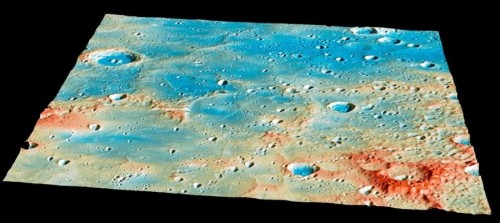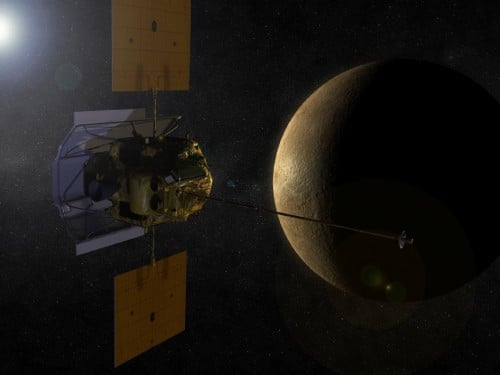An American research spacecraft has finished exploring the planet Mercury

The American research spacecraft Messenger crashed tonight as planned on the surface of the planet Hema - Mercury. The spacecraft was launched almost 11 years ago, orbited the planet for the past four years, and was the first spacecraft to study it thoroughly. Among other things, her findings proved that Hema is a real planet, and not a moon drifting into orbit around the sun, and also that it has a liquid core that gradually cools. When the spacecraft ran out of fuel, it entered a crash course, and hit Hema in the face at a speed of about 14,000 kilometers per hour. The crash created a large crater, and it will be explored by a Japanese-European spacecraft that should reach Mercury in the next decade.
The planet Hema - Mercury - is the smallest in our solar system and the closest to the Sun. Although humans noticed it already thousands of years ago, it is one of the bodies in the solar system that has been studied the least: it is very difficult to observe it with telescopes from Earth, because of its proximity to the Sun, and until a few years ago only one spacecraft, Mariner 10, passed by it in the years The 70th (1974-75). Seven years ago, the American spacecraft "Messenger" passed by Mercury, and three years later (2011) entered orbit around it, in an attempt to decipher some of its secrets. "Over the years, a lot of question marks have accumulated about Hema: is there ice on its surface, what are the processes that shaped its development, why is Hema such a dense body and what is the nature of Hema's Earth-like magnetic field", explains the amateur astronomer Oded Avraham, From NASA's "Solar system Ambassadors" program. "In addition, the question was asked which volatile substances are available in Hema, those that are also found in the Earth, which may show whether Hema is a planet or a grown moon that was swept away by the Sun to its current orbit."

the small crater
The scientific mission of the "Messenger" spacecraft was supposed to last only one year, but was repeatedly extended to more than four years. After its fuel ran out last month, the spacecraft began to lose altitude in preparation for a planned crash on the surface of Mercury, which will likely occur tomorrow (Thursday) at approximately 22:30 PM (Israel time). The crash itself should also yield a lot of scientific information. "The crushing will create a 16 m diameter crater on the surface of Hema, which will not be visible from Earth, but it will be studied by Bepi-Colombo, a joint European-Japanese mission that should reach Mercury at the beginning of the next decade," explains Avraham. "The crater will allow her to study the materials that are under the surface of Hema, and will be scattered around the crater, the date of its formation will of course be known with great precision."
Writing the encyclopedia
The name of the spacecraft, "Messenger", is an English acronym for Mercury Surface, Space Environment, Geochemistry, and Ranging, meaning the study of the environment, surface and geochemistry of Hema. The name also corresponds with mythology - Mercury, or Hermes as it was called in ancient Greece, was the messenger of the gods, meaning - messenger. The small spacecraft, weighing less than half a ton, answered in its mission many questions concerning the nature of the planet, Abraham explains following a conversation with the scientific director of the mission, Professor Ralph McNutt (McNutt) from John Hopkins University. "Heat is better understood today on a global level: it was found that its core is relatively liquid, it was found that the magnet and its sphere are experiencing change processes, its gravity was mapped which is not uniform everywhere, height measurements were made all over the planet and it was found that heat continues to cool and contract," says Avraham. "According to Prof. McNutt, the findings show unequivocally that Hema is more similar to Earth than to the Moon, and it is indeed a rocky planet and not a moon that drifted from another place in the Sun's orbit."
However, these discoveries are only the beginning. "The large amount of information accumulated during the approximately four years of orbit around Hema - about ten terabytes - will be analyzed by scientists around the world, and virtually anyone with a computer will be able to access the data and look for discoveries. This is one of NASA's greatest achievements", concludes Avraham. "It is possible that in the coming year we will already see the Hema encyclopedia rewritten, and even expanded."
small and mysterious
MESSENGER's successful mission is part of a large wave of progress in the study of the relatively small bodies in the solar system. Last year we all watched in amazement the first successful landing on a comet. A few weeks ago, the dawn spacecraft entered orbit around the dwarf planet Keres, and in three months the "New Horizons" spacecraft will reach Pluto, which was the smallest planet at the time of launch, but during its long journey its status was lowered and it is now defined as a "dwarf planet". This wave of exploration shows that even after nearly six decades of launching satellites and spacecraft, we still know very little about the solar system, our little corner of the infinite universe.

3 תגובות
When the Japanese spacecraft arrives to explore the crater, there will be some nervous Mercurians waiting for it…..
It's been more than five decades that I've been following the newspapers, from the days of Sputnik until today, and I can't get enough of curiosity. And the end of science. find out everything Do not listen to those who claim to know everything, the one who understands will understand.